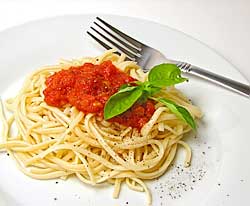 Lycopene
Lycopene Is it true that italians get less prostate cancer than other nationaliteies? There doesn't seem to be any information on this, but there's no doubt that the current interest in lycopene would suggest it! Lycopene is a carotenoid found primarily in tomatoes, and men who eat lots of cooked tomatoes have very low rates of prostate cancer.
In one study, 32 prostate cancer patients ate a pasta meal covered with three-quarters of a cup of tomato sauce every day for three weeks. Results showed their PSA levels dropped two points. Even signs of DNA damage dropped sharply.
The best sources of lycopene are processed tomato products such as tomato paste and tomato sauce. The recommended dosage for prevention is asbout 15 mg/day while double that is suggested for treatment.
So get going on that pasta (wholegrain of course...)
Several epidemiological studies have found fish oils to be effective in preventing both BPH and prostate cancer. A daily intake of about 500-1000 mg of EPA plus DHA is needed for maximum benefit.
British researchers have found that men who consume garlic at least twice a week have a 44% reduced risk of prostate cancer.
Low vitamin D levels have been found to be associated with an increased risk of prostate cancer, but you'll probably get sufficient of this during your daily life.
A recent US clinical trial concluded that pomegranate juice is effective in slowing the progression of prostate cancer. One 8oz glass of juice per day increased the stability period of prostate cancer by a factor of four.
At least two clinical studies have found red clover (Trinovin) effective in halting the progression of low-to moderate-grade prostate cancer tumours. The dosage used was 40 mg four times daily. Supposedly good for several other ailments as well (including menopause).
A powerful antioxidant and anti-inflammatory claimed to be effective in dealing with category III prostatitis or chronic pelvic pain syndrome. Quercetin also shows remarkable anti-tumour properties. A recent study in the British Journal of Cancer shows that in combination with ultrasound at 20 KHz for 1 minute duration, skin and prostate cancers show a 90% mortality within 48 hours with no visible mortality of normal cells
Zyflamend is a standardized combination of extracts of turmeric, ginger, Holy Basil, green tea, rosemary, skullcap, and oregano.
All the prostate health supplements will contain several of the above chemicals, e.g.. selenium, calcium d-glucarate (CDG), lycopene, broccoli extract (must contain a minimum of 125 mcg sulforaphane), green tea, and maitake mushroom extract. The big question is, of course, how much?
At this stage, there are many different opinions on recommended dosages. The important thing is to make sure you get standardized ingredients.
Next page: Supplements that may help an enlarged prostate and prostitis
Deprecated: Invalid characters passed for attempted conversion, these have been ignored in /usr/home/travelsignposts/public_html/yourprostate/powerrss/scopbin/911006.php on line 1
Deprecated: Invalid characters passed for attempted conversion, these have been ignored in /usr/home/travelsignposts/public_html/yourprostate/powerrss/scopbin/911006.php on line 1
Deprecated: Invalid characters passed for attempted conversion, these have been ignored in /usr/home/travelsignposts/public_html/yourprostate/powerrss/scopbin/911006.php on line 1
Deprecated: Invalid characters passed for attempted conversion, these have been ignored in /usr/home/travelsignposts/public_html/yourprostate/powerrss/scopbin/911006.php on line 1